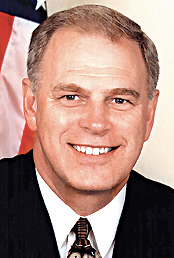Gov. Strickland criticizes Bush for rejecting children’s insurance plan

Ohio Governor Ted Strickland (D-Lisbon)
Sherrod Brown was also critical of the president.
COLUMBUS (AP) — Ohio Gov. Ted Strickland blasted the Bush administration on Friday for rejecting a plan the state had crafted to cover up to 35,000 additional uninsured children under Medicaid.
“I am appalled at the heartless decision of the Bush Administration to reject Ohio’s bipartisan plan to provide health care access to thousands of our children,” he said in a statement. “Sadly, this is an indication that the president and his advisers are totally out of touch with the struggles faced by so many Ohio families.”
Strickland said he received word late Thursday that the request had been rejected.
The governor is facing other Medicaid challenges, as new projections show the state has budgeted $207 million less than it will need to handle Medicaid demand this budget cycle. The start dates for expanded benefits to pregnant women, some foster children and disabled working people will depend on final budget figures Strickland receives in January, said spokesman Keith Dailey.
Ohio needed federal government approval to move forward with a plan to use the state’s Medicaid match for health care coverage to children from families earning between 200 percent and 300 percent of the federal poverty level. The poverty level is $20,650 a year for a family of four.
Of the 35,000 children who would have been eligible under the plan, 20,000 were expected to participate, said Strickland spokesman Keith Dailey.
Federal authorities said the arrangement, struck as part of the state’s two-year budget, was impossible to accept because it violated Medicaid rules that say money from the government health insurance program for low-income families can’t be used for those making more than twice the poverty rate. Strickland’s office disagrees with that legal interpretation, and said it was wrong to reject a plan that had been hammered out by his Democratic administration and the Republican state Legislature.
The governor had met and spoken by phone to Health and Human Services Secretary Michael Leavitt several times about the plan, and Strickland had told reporters Leavitt was encouraging.
He said in his statement that Leavitt had encouraged him to seek authority to use the federal matching money to cover children of families earning up to 250 percent of poverty, rather than 300 percent.
“While we plan to reapply to cover children between 200 and 250 percent, every option remains on the table for the remaining children, including litigation,” Strickland said. “I will fight until every Ohio child has access to the health care they deserve.”
Dailey said there are an estimated 20,627 uninsured children in families between 200 percent and 250 percent of poverty, and the Ohio Department of Job and Family Services estimates that 10,671 would seek health insurance from the state if it were available.
Democratic Sen. Sherrod Brown was equally critical.
“It’s both far-fetched and offensive that this administration thinks they know better than Ohioans when it comes to the needs of our kids,” he said in a statement.
Dailey said the administration still plans to go ahead with the schedule it has in place for rolling out expanded Medicaid benefits for pregnant women, foster children from 18 to 21, and working people who are disabled.
However, start dates of Jan. 31 for the first two groups, and of April 1 for the third group are still dependent on final figures the governor receives in January, Dailey said.
Plans to restore dental benefits for 700,000 low-income Ohioans and to boost Medicaid payments to hospitals and doctors who care for the poor are also on hold as the situation is assessed.
 43
43
